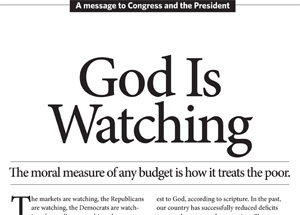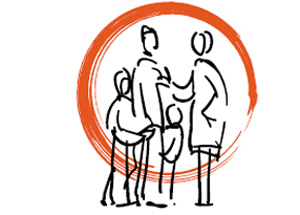Economics
Today, "Values and Capitalism," a project of the American Enterprise Institute, sponsored a full-page ad in Politico (see page 13) in response to the Circle of Protection. While it is encouraging to see another full-page ad urging our nation's legislators to be concerned about the poor, it is unfortunate that the critique of the Circle of Protection and Sojourners work is based on an error.
The debate we have just witnessed has shown Washington, D.C. not just to be broken, but corrupt. The American people are disgusted watching politicians play political chicken with the nation's economy and future. In such a bitter and unprincipled atmosphere, whoever has the political clout to enforce their self-interest and retain their privileges wins the battles. But there are two casualties in such political warfare: the common good and the most vulnerable.
So how will vulnerable people fair under this deal? "The Circle of Protection," a diverse nonpartisan movement of Christian leaders, has been deeply engaged in the budget debate to uphold the principle that low-income people should be protected. But it is hard to evaluate a deal that averts a crisis when the crisis wasn't necessary in the first place. Over the past few weeks, our economy has indeed been held hostage as politicians negotiated the price of the release. Ultimately, I think most of us wish that no hostages had been taken in the first place, and this was no way to run a government or make important budget decisions.
Late last night it was announced that the president and congressional leadership reached a deal that should ensure that our country does not default on its debts. Now Congress is in the midst of making their decision on the plan. Already the media is trying to hash out who won and who lost, who is up and who is down, and what kind of effect the events of July 2011 will have on how the country votes in November 2012.
The other day the mail brought an advertisement for something I desperately need (or so the ad suggested). If I ordered it right now, the ad said, I would save a hefty percentage off the usual price. In vain I searched the flyer for the price. None was listed -- not the total, not my monthly payment. I was apparently supposed to place my faith in the kindly marketers and order it anyway.
I guess I should be used to this sort of marketing. After all, that's how our federal government does business. Shall we a. fight a war in Iraq? b. add a war in Afghanistan? c. subsidize medical care for seniors and the poor? d. rescue failed financial institutions? e. subsidize growers of corn and soybeans? or f. fund interstate highways?
In response to Sojourners' radio ads about the budget debates, the Family Research Council's political action committee has launched radio ads in Kentucky and Ohio arguing that deficit reduction should cut programs that serve poor and vulnerable people. The ads assert that it is the private individual, not government, who has a responsibility to the poor. The ads say, "Jesus didn't instruct the government of his day to take the rich young ruler's property and redistribute it to the poor. He asked the ruler to sell his possessions and help the poor. Charity is an individual choice, not a government mandate."
This could put the speaker of the House, a Catholic, in a difficult position. Catholic social teaching instructs that the government does have a direct responsibility to the poor and that private charity is only one of the ways that Christians express concern for "the least of these." This ad sets itself in direct opposition to that teaching and the values that it comes from. The speaker was already in a tough spot when the Catholic bishops came out with a strong critique of the House plan, but now he has a powerful political organization calling for him to ignore Catholic social teaching all together.
 The markets are watching, the Republicans are watching, the Democrats are watching, the media are watching, the pollsters and pundits are watching. The public is watching and is disgusted with Washington, D.C.
The markets are watching, the Republicans are watching, the Democrats are watching, the media are watching, the pollsters and pundits are watching. The public is watching and is disgusted with Washington, D.C.
When it comes to the bitter and ultra-partisan battles over the budget, the deficit, and the fast-approaching deadline for America defaulting on its financial commitments, the whole nation and even the world is watching.
But God is watching too.
"God is Watching," reads the headline for a full page ad Sojourners ran in this morning's Politico. It is the latest in a series of radio, print, and online ads we have put out on the budget debate and default crisis. On Tuesday, we launched radio ads in Kentucky, Nevada, and Ohio that were recorded by local pastors who lifted up the moral issues at stake in the debate.
Furthermore, our work in the past few weeks and the Circle of Protection meeting with the president has been covered by the Washington Post (and here), CNN (and here), MSNBC, Politico, Roll Call, and many local outlets from across the country. Behind all the ads and the press is the muscle -- and that muscle is you.
Where has all the sanity gone?
I, for one, never expected in my wildest dreams to pine for the days of Ronald Reagan. But I'm there.
And for everyone who is blaming "everyone" on this debt ceiling debacle, you're just dead wrong. The Democratically controlled House and Senate in the 80s did not hold President Reagan hostage when he had to raise the debt ceiling. And that is exactly what is happening. And the problem is that this is a train wreck that has been months in the coming. The only thing that we don't know is how bad the carnage will be.
We have come to an impasse in the negotiations to raise the debt ceiling because of several conceptual errors in our public discourse. These errors were most glaring in the remarks recently delivered by Speaker of the House John Boehner in his response to President Obama. The largest conceptual error is the idea that the government of a constitutional representative democracy is different from the people. Boehner said, "You know I've always believed the bigger the government, the smaller the people."
What does this mean? The government is composed of the people, and if people are paying attention and voting according to their own interests, the government ought to work toward the happiness of the people. The problem is that too many Americans have bought into this conceptual error that the government is some kind of leviathan, a monster that exists to take away their liberties. This is nonsense. A correction of another conceptual error in Boehner's presentation makes my point.
 If you live in Kentucky, Nevada, or Ohio and listen to Christian or country radio, you'll be hearing some of Sojourners' new radio ads calling for legislators to remember the least of these during this default crisis. For those of you who haven't completed your migration over to Google+, you might also start to see some ads popping up on your Facebook page in the next few days asking you to speak out on behalf of those in need. The reason we are running these ads is simple: The rich have lobbyists while those in need don't, and that's why Christians need to speak out and form a "Circle of Protection." If you don't live in one of these areas (or aren't listening to Christian or country radio) you can listen to the ads here.
If you live in Kentucky, Nevada, or Ohio and listen to Christian or country radio, you'll be hearing some of Sojourners' new radio ads calling for legislators to remember the least of these during this default crisis. For those of you who haven't completed your migration over to Google+, you might also start to see some ads popping up on your Facebook page in the next few days asking you to speak out on behalf of those in need. The reason we are running these ads is simple: The rich have lobbyists while those in need don't, and that's why Christians need to speak out and form a "Circle of Protection." If you don't live in one of these areas (or aren't listening to Christian or country radio) you can listen to the ads here.
Walmart has launched a charm offensive as part of its new urban strategy to impose smaller versions of its big box in inner cities across the country. It has proposed four stores for Washington, D.C. -- all in predominantly minority, and most in low-income, neighborhoods.
The debate over building Walmart stores in D.C. is engaging intense public sentiment, and for good reason. While Walmart promises new jobs in a community, in reality it displaces other local businesses, leaving in question whether there is a net jobs gain; one study showed that for every retail job Walmart brought, communities lost 1.4 other jobs. In addition, Walmart passes on the cost of its low wages to taxpayers when associates and their families rely on publicly funded health care and other assistance programs.
As the time shortens for Congress and President Obama to agree to the contours of legislation to raise the nation's debt ceiling, I am reminded of the story of King Solomon and his judgment regarding two women who both claimed to be the mother of a child (I Kings 3: 16-28). Solomon ordered that the living child be cut in two and half a dead child be given to both women. The woman who was the true mother insisted that the living child be given to the false mother. She was willing to give up her righteous claim to save the child's life.
 With the scandal around Rupert Murdoch growing by the day, a full-fledged boycott of News Corp. has been launched on the internet, according to the Washington Post.
With the scandal around Rupert Murdoch growing by the day, a full-fledged boycott of News Corp. has been launched on the internet, according to the Washington Post.
The website Boycott Murdoch also has Facebook and Twitter pages. While the boycott has received coverage on many mainstream news outlets, it has yet to gain much traction. The Facebook page has less than 700 fans and the Twitter page is approaching only 1,000 followers. To make even a small dent in Murdoch's bottom line, the boycott will need to metastasize, and quickly.
Today is another intense day of politics at the White House. The debt default deadline is fast approaching. The stakes for the nation are high as politicians can't agree on how to resolve the ideological impasse on how to reduce the deficit before the nation defaults on its financial obligations.
Yesterday, before Congressional leaders were due at the White House for critical negotiations, I, along with 11 other national faith leaders, met with President Obama and senior White House staff for 40 minutes. We were representing the Circle of Protection, which formed in a commitment to defend the poor in the budget debates. Sitting in the Roosevelt Room of the White House, we opened in prayer, grasping hands across the table, and read scripture together. We reminded ourselves that people of faith must evaluate big decisions on issues like a budget by how they impact the most vulnerable.
 Today, I, alongside other faith leaders, met with President Obama about the critical budget debate. We are grateful and hopeful leaving this meeting. Please pray for us as the conversation continues.
Today, I, alongside other faith leaders, met with President Obama about the critical budget debate. We are grateful and hopeful leaving this meeting. Please pray for us as the conversation continues.
Since early this spring, Sojourners, with your invaluable help, has strongly advocated with the president and Congress, asking for a responsible plan to reduce our nation's deficit -- a plan that protects the poorest and most vulnerable. We have asked, "What Would Jesus Cut?" We have prayed and fasted, and now thousands of you have signed on to the Circle of Protection: a statement on why we need to protect programs for the poor.
It's funny the things that you remember. I can remember one time when I was a teenager watching an episode of the Montel Williams show. I don't remember the topic, but I do remember Montel criticizing the U.S. government for spending too much money on military defense and not enough on domestic needs. I remember thinking to myself, "That's the stupidest thing I've ever heard." In the world that I knew, the idea of slashing military spending was absolutely, totally, utterly UNTHINKABLE! I personally had never met anyone who thought that way, so I assumed that anyone who would suggest such a thing had to be either a) naive; b) stupid; c) a tree-hugger; or d) unAmerican.
That was then.
I don't know if it's because I changed or because America has changed (or both), but for years it seemed like the only ones who suggested slashing military spending were groups that few Americans could identify with: like hippies, pacifists, environmental and civil rights activists, and conspiracy theorists. Today, the idea that a significant portion of the nation's economic woes is due to wasteful Pentagon spending can be found both on the left and on the right ends of the political spectrum. It can also be found in the Pentagon.
Meet "Mr. Y."
 Several weeks ago (right before I left for my sabbatical), I joined with six other pastors from around the country -- in partnership with Sojourners -- to draft an open letter to Congress and President Barack Obama regarding the budget and the proposals to cut certain programs that aid the poor in our country. Our hope was to invite at least 1,000 pastors to join us in signing this document.
Several weeks ago (right before I left for my sabbatical), I joined with six other pastors from around the country -- in partnership with Sojourners -- to draft an open letter to Congress and President Barack Obama regarding the budget and the proposals to cut certain programs that aid the poor in our country. Our hope was to invite at least 1,000 pastors to join us in signing this document.
As of today, we've had nearly 5,000 pastors and Christian leaders from all 50 states join us in signing this open letter, and we hope to keep adding voices and signatures. As a pastor and Christian leader will you add your voice to let our political leaders know that you stand with the poor?
Read the letter below and if you resonate with our message, please sign your name.

As Christians concerned about poverty, it is time to turn our full attention to the injustices of an "offshore tax system" that enables corporations and the wealthy to dodge taxes and impoverish countries around the world.
As members of Congress in the United States debate deep and painful budget cuts, people of faith should raise our voices against an unfair system that enables profitable U.S. corporations to dodge taxes, depleting an estimated $100 billion from the U.S. Treasury each year. Instead of cutting $1 trillion over the next decade from programs that assist the poor and ensure greater opportunity, we should eliminate these destructive tax gimmicks.
Recent reports show that aggressive tax dodgers such as General Electric, Boeing, and Pfizer, avoid billions in taxes a year. They use accounting gymnastics to pretend they are making profits in offshore subsidiaries incorporated in low- or no-tax countries like the Cayman Islands, thereby reducing their tax obligations in the United States. This system is unfair to domestic businesses that have to compete on an un-level playing field.
The way you think and feel about the world is shaped by what you see when you get out of bed in the morning. I remember hearing this from civil rights activists. It simply means that perspective is hugely determined by place, context, and vantage point. This is profoundly true for me and most of the people I've ever met. You see the world from the place you live.
Part of the problem in the current budget impasse in Washington, D.C. is the perspectives of the politicians in the debate. Every morning they see and hear each other; the gladiator ring of national politics; the Washington media; their donors; their ideological base; and their latest poll ratings.
As the federal debt ceiling standoff threatens to cause an economic catastrophe for our nation, more than 4,000 pastors across the country are opposing proposed immoral budget cuts that harm the most vulnerable people in their congregations and communities. An open letter to Congress and the president ran today as a full page ad in Politico. (You can view the ad and full list of signers here.) We were amazed by the huge response this letter generated. We hoped to find 1,000 pastors willing to speak out with us, and in just 2 weeks more than 4,000 clergy joined our campaign.